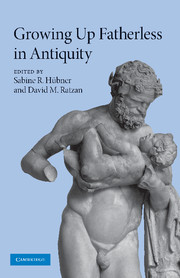Book contents
- Frontmatter
- Contents
- List of figures
- List of tables
- List of contributors
- Acknowledgments
- Note on abbreviations
- INTRODUCTION
- 1 Fatherless antiquity? Perspectives on “fatherlessness” in the ancient Mediterranean
- PART I COPING WITH DEMOGRAPHIC REALITIES
- PART II VIRTUAL FATHERLESSNESS
- PART III ROLES WITHOUT MODELS
- PART IV RHETORIC OF LOSS
- 11 The disadvantages and advantages of being fatherless: the case of Sulla
- 12 An imperial family man: Augustus as surrogate father to Marcus Antonius' children
- 13 Cui parens non erat maximus quisque et vetustissimus pro parente: paternal surrogates in imperial Roman literature
- 14 The education of orphans: a reassessment of the evidence of Libanius
- 15 “Woe to those making widows their prey and robbing the fatherless”: Christian ideals and the obligations of stepfathers in late antiquity
- Bibliography
- Index
13 - Cui parens non erat maximus quisque et vetustissimus pro parente: paternal surrogates in imperial Roman literature
Published online by Cambridge University Press: 30 July 2009
- Frontmatter
- Contents
- List of figures
- List of tables
- List of contributors
- Acknowledgments
- Note on abbreviations
- INTRODUCTION
- 1 Fatherless antiquity? Perspectives on “fatherlessness” in the ancient Mediterranean
- PART I COPING WITH DEMOGRAPHIC REALITIES
- PART II VIRTUAL FATHERLESSNESS
- PART III ROLES WITHOUT MODELS
- PART IV RHETORIC OF LOSS
- 11 The disadvantages and advantages of being fatherless: the case of Sulla
- 12 An imperial family man: Augustus as surrogate father to Marcus Antonius' children
- 13 Cui parens non erat maximus quisque et vetustissimus pro parente: paternal surrogates in imperial Roman literature
- 14 The education of orphans: a reassessment of the evidence of Libanius
- 15 “Woe to those making widows their prey and robbing the fatherless”: Christian ideals and the obligations of stepfathers in late antiquity
- Bibliography
- Index
Summary
INTRODUCTION: BEREAVEMENT AND SELF-PRESENTATION
Despite its relatively high incidence, fatherlessness presented a social challenge to young aristocratic Roman men who aspired to a political career. Roman society placed great emphasis on the authority wielded by a father, the emulation of his example by his sons, and the political and social connections granted through membership in a high-status family. Upper-class Roman literary sources generally represent youth as an unstable age, in need of careful guidance. Pliny the Younger, for example, observes that the son of Corellia Hispulla, an adulescens, needs “not only a teacher but also a guardian and a master at this slippery period of life.” In addition to the prejudice that might potentially be focused upon the young man without a guardian, a fatherless man could also find himself without the important links of patronage or suffragium that were essential at the beginning of an imperial Roman career. The social disadvantages affecting legitimately born children bereaved of their fathers at an early age naturally differ considerably from those affecting the illegitimate, though in comparison with other societies ancient Rome was remarkably free of prejudice against the illegitimate. While servile or freedmen “child-minders” might provide instructive and (potentially) psychologically stabilizing companionship for a fatherless young man, of necessity they could not provide the social benefits that came from a publicly visible association with an older upper-class man.
- Type
- Chapter
- Information
- Growing Up Fatherless in Antiquity , pp. 241 - 256Publisher: Cambridge University PressPrint publication year: 2009
- 1
- Cited by

